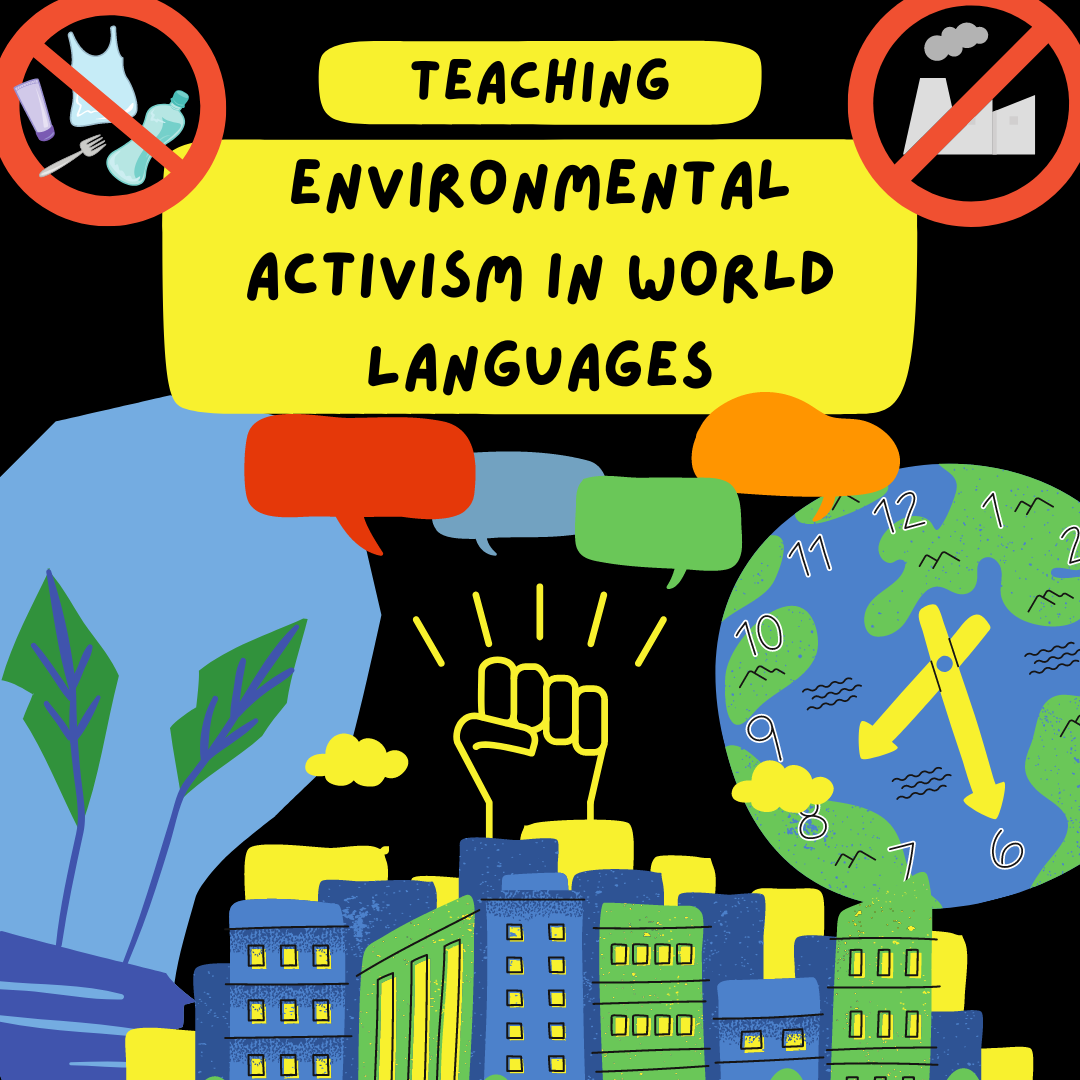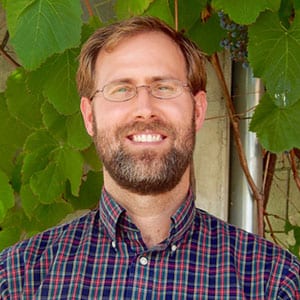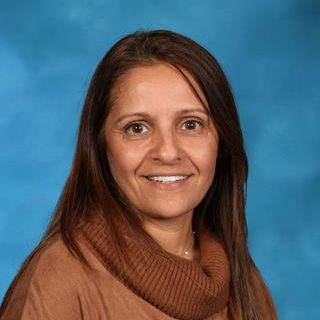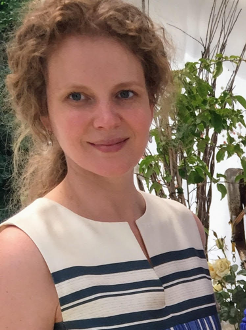K12 World Language and Global Learning Projects

Teach Environmental Activism using MovieTalk - Five Units for World Language Teachers
MovieTalk, a technique used increasingly in communicative approaches to world language education, is an example of a new paradigm of learning that grants all students empowering access to classroom discourse (Delavan & Matranga, 2020). The use of this technique can be traced back at least to 1988 as the principal technique of a learning program called Focal Skills (Hastings, 1995, 2012). MovieTalk has been spreading rapidly among the community of world language practitioners who center their approach on comprehensible input (Ash, 2018; Herman, 2014; Murphy & Hastings, 2006). It is rather straightforward: Instructors choose an engaging segment of video and either (a) turn off the sound in order to narrate over the video with input finely tuned to the comprehension abilities of the students or (b) allow students to hear the audio then pause the video frequently to engage the students in rich, choral questioning about one segment at a time, recasting any language used in the video (either English or the target language) at the appropriate complexity for the students.
MovieTalk is especially effective at empowering novice students when the featured language chunks are visible in written form next to a selected video. The instructor uses a laser pointer to ensure students are constantly using this scaffold. The featured language chunks are repeated and practiced by asking literally hundreds of questions over the course of the activity. Students with higher proficiency for whom choral responses become less useful can (a) engage with partners during pauses or (b) take over as leaders who run another round of the same MovieTalk in small groups.
The five MovieTalk units below were developed by in-service teachers in Georgia who worked together in a Professional Learning Community (PLC) focused on building world language curriculum around the theme of global sustainability activism. The PLC was facilitated by Dr. Garrett Delavan, Assistant Professor of World, Dual, and ESOL Language Education at Georgia State University, and supported by the Atlanta Global Studies Center and GSU’s Center for Transnational and Multilingual Education. These units are now available to all K12 World Language and DLI instructors through the Atlanta Global Studies Center K12 Curriculum Webpage. These units were developed for the target languages of Spanish and German. They can be modified for the instruction of other languages.
Environmental Issues and Activism in the Spanish Immersion Classroom by Ana Cotton, Spanish Teacher, Jonesboro Middle School
Environmental Issues via MovieTalk for Spanish DLI (Novice to Advanced) by Anastasia James, Spanish DLI Instructor, Sweetwater Middle School
Environmental Activism through MovieTalk Videos, a 5-lesson Unit for Spanish 1 by Ayvonne Reese, Spanish Teacher, Cross Keys High School
Environmental Issues and Activism in Target Language Communities, a 4-lesson MovieTalk Unit for German 2 by Mirela Kimbrough, German Teacher, Brookwood High School
How to Save the Planet from Climate Change, a MovieTalk Unit for Middle Level Spanish DLI by Rosario Elmore, Spanish DLI Teacher, Sweetwater Middle School
For more information about teaching global sustainability in world language classrooms, please contact Dr. Garrett Delavan at gdelavan@gsu.edu.
 Garrett Delavan is an assistant professor at Georgia State University in the College of Education & Human Development’s Department of Middle and Secondary Education and an affiliated faculty member in the college’s Center for Transnational and Multilingual Education. He received his doctorate in language, culture and curriculum from the University of Utah in 2017 and his master’s degree in linguistics with an emphasis in bilingual education. Before joining the CEHD faculty, he spent three years as an assistant professor of multilingual and multicultural education in the School of Education at California State University San Marcos.
Garrett Delavan is an assistant professor at Georgia State University in the College of Education & Human Development’s Department of Middle and Secondary Education and an affiliated faculty member in the college’s Center for Transnational and Multilingual Education. He received his doctorate in language, culture and curriculum from the University of Utah in 2017 and his master’s degree in linguistics with an emphasis in bilingual education. Before joining the CEHD faculty, he spent three years as an assistant professor of multilingual and multicultural education in the School of Education at California State University San Marcos.
 Teach Arabic through this Interactive Unit and Detailed Lesson Plan on Food - developed by Hana Arslan for Sixth Graders, Novice High to Intermediate Low (2020-21)
Teach Arabic through this Interactive Unit and Detailed Lesson Plan on Food - developed by Hana Arslan for Sixth Graders, Novice High to Intermediate Low (2020-21)
Learning about food works as a "hook" to grasp students’ attention to Arabic Culture. It triggers their curiosity and increases their motivation. Because students were not able to participate in group cooking projects or restaurant simulations in person this year because of the pandemic, this lesson plan includes ideas for teaching language interactively through Zoom and Nearpod. Along with Nearpod, additional activities on Quizlet and Word Wall support and reinforce students' learning. Click on the hyperlinks to see examples. Open the lesson plan to explore all activity links.
This unit encourages students to discover how food is different from one culture to another and helps students to communicate practically in Arabic, express basic needs, and order food and drinks from a restaurant. The unit also includes a lesson idea on tackling UN Sustainable Development Goal 2 "Zero Hunger." Students can organize a food drive of non-perishable products for a charitable organization of their choice.
These engaging lessons build on acquired skills through repetition and scaffolding, allowing students to learn in a structured way, interact with teacher and classmates, compete with self and others, and reflect upon and assess their progress as learners.
 Hana Arslan is a native Arabic speaker from Beirut, Lebanon, and an Arabic instructor at Amana Academy, a public charter school in Alpharetta GA, with 700 students. Hana has been teaching Arabic since the school's opening in 2005 and helped develop the K-8 Arabic curriculum with a team of dedicated and committed Arabic teachers. Hana believes that students learn best when they engage in active learning and when they are allowed to take ownership of their learning. Hana is also a member of the Arabic Teachers Council of the South. Read more about Hana Arslan's project.
Hana Arslan is a native Arabic speaker from Beirut, Lebanon, and an Arabic instructor at Amana Academy, a public charter school in Alpharetta GA, with 700 students. Hana has been teaching Arabic since the school's opening in 2005 and helped develop the K-8 Arabic curriculum with a team of dedicated and committed Arabic teachers. Hana believes that students learn best when they engage in active learning and when they are allowed to take ownership of their learning. Hana is also a member of the Arabic Teachers Council of the South. Read more about Hana Arslan's project.
 Russian Travel Unit for Novice High /Intermediate Mid Level developed by Dr. Anna Surin (2019-20)
Russian Travel Unit for Novice High /Intermediate Mid Level developed by Dr. Anna Surin (2019-20)
This unit is designed to teach Novice High/Intermediate Mid students of Russian to plan and organize a trip, solve simple problems while traveling, and reflect on the benefits of new experiences. All activities and assessments are created according to GA performance standards and ACTFL guidelines. The unit length is approximately 9 weeks, but it can be adjusted to the teacher and student needs, goals and abilities.
Through the engaging activities and the use of authentic resources (YouTube videos, travel shows, blogs and podcasts), teachers will immerse their students in the target language and culture and help students improve language proficiency. The use of formative assessments of students’ achievements will allow teachers to scaffold language learning and build on what the students already know as well as provide constructive feedback.
 Dr. Anna Surin has 20 years of teaching experience as a Russian, French, and ESOL teacher. She is the World Languages Department Chair at North Forsyth High School, the International Skills Diploma Seal coordinator, the sponsor of the French Honor Society and the Russian Club. Anna received her bachelor’s degree from Russian State Pedagogical University, a master’s degree from Metropolitan College of New York, and her doctorate degree from Valdosta State University. Dr. Surin is the 2019 FLAG Teacher of the Year Award Recipient.
Dr. Anna Surin has 20 years of teaching experience as a Russian, French, and ESOL teacher. She is the World Languages Department Chair at North Forsyth High School, the International Skills Diploma Seal coordinator, the sponsor of the French Honor Society and the Russian Club. Anna received her bachelor’s degree from Russian State Pedagogical University, a master’s degree from Metropolitan College of New York, and her doctorate degree from Valdosta State University. Dr. Surin is the 2019 FLAG Teacher of the Year Award Recipient.
Do you have a less-commonly taught language lesson plan, activity, or global learning project that you would like to share with other teachers? We welcome your contributions at AGSC@gsu.edu!
Coming soon!
- Cultural Awareness for High School Arabic Learners by Mr. Alaa Hedeeb: World Language Department, Clayton County Public School, Jonesboro High School
- K-12 Virtual STEM Toolkits for Language Teachers (Chinese, Japanese, Russian)
Advances and integrates content-based instruction about STEM/Sustainability topics. The toolkits include lesson plans, virtual teaching resources, guiding discussion and study questions, and a teacher introduction to the principles of content-based language teaching.

